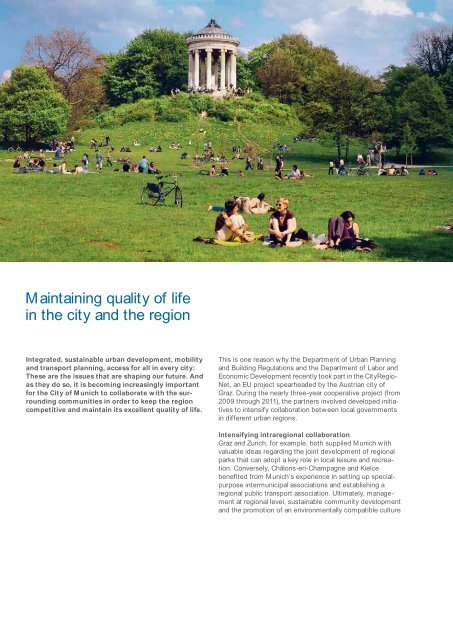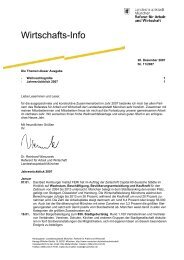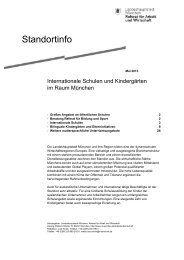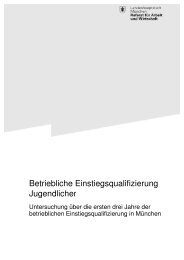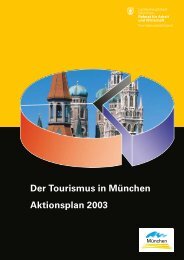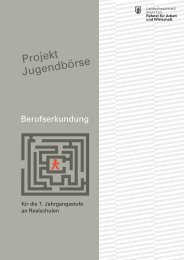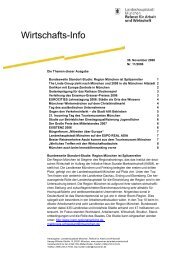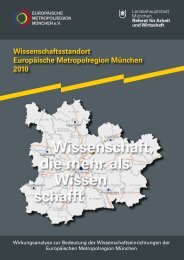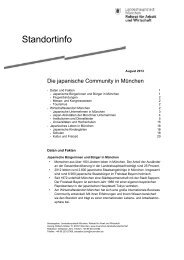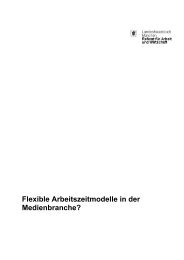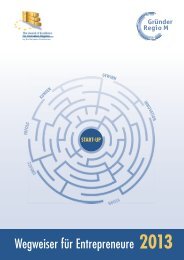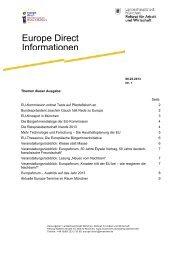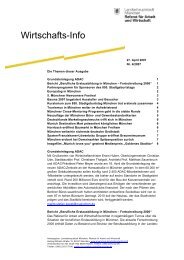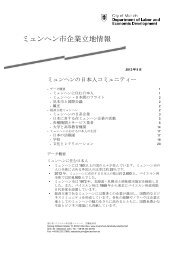Europa-Tag - Referat für Arbeit und Wirtschaft
Europa-Tag - Referat für Arbeit und Wirtschaft
Europa-Tag - Referat für Arbeit und Wirtschaft
You also want an ePaper? Increase the reach of your titles
YUMPU automatically turns print PDFs into web optimized ePapers that Google loves.
22 Projekte <strong>Europa</strong>-Jahresbericht 2011<br />
Maintaining quality of life<br />
in the city and the region<br />
Integrated, sustainable urban development, mobility<br />
and transport planning, access for all in every city:<br />
These are the issues that are shaping our future. And<br />
as they do so, it is becoming increasingly important<br />
for the City of Munich to collaborate with the surro<strong>und</strong>ing<br />
communities in order to keep the region<br />
competitive and maintain its excellent quality of life.<br />
This is one reason why the Department of Urban Planning<br />
and Building Regulations and the Department of Labor and<br />
Economic Development recently took part in the CityRegio-<br />
Net, an EU project spearheaded by the Austrian city of<br />
Graz. During the nearly three-year cooperative project (from<br />
2009 through 2011), the partners involved developed initiatives<br />
to intensify collaboration between local governments<br />
in different urban regions.<br />
Intensifying intraregional collaboration<br />
Graz and Zurich, for example, both supplied Munich with<br />
valuable ideas regarding the joint development of regional<br />
parks that can adopt a key role in local leisure and recreation.<br />
Conversely, Châlons-en-Champagne and Kielce<br />
benefi ted from Munich’s experience in setting up specialpurpose<br />
intermunicipal associations and establishing a<br />
regional public transport association. Ultimately, management<br />
at regional level, sustainable community development<br />
and the promotion of an environmentally compatible culture<br />
Reference Framework<br />
for Sustainable Cities<br />
The Department of Urban Planning and Building Regulations<br />
joined forces with the Department of Health and the<br />
Environment to develop a Reference Framework for European<br />
Sustainable Cities (RFSC). This reference framework<br />
was initiated <strong>und</strong>er the French presidency of the European<br />
Council and is now being fl eshed out in collaboration with<br />
the EU member states. In 2007, the member states signed<br />
the “Leipzig Charter on Sustainable European Cities”. The<br />
reference framework should support the implemen tation of<br />
this charter. The test phase for the framework took place in<br />
spring and summer 2011. Also, to allow the test cities in<br />
of regional mobility have proven vital to the future development<br />
prospects of Munich and the surro<strong>und</strong>ing region.<br />
Aware of this, the Department of Urban Planning and Building<br />
Regulations decided to apply itself to precisely these<br />
issues in a new EU project named MORECO, which builds<br />
on the outcomes of the CityRegioNet.<br />
MORECO project launched:<br />
Mobility and Residential Costs<br />
The MORECO project was launched in summer 2011. Under<br />
its aegis, partners from aro<strong>und</strong> the Alpine region<br />
are concerning themselves with the link between mobility<br />
and residential costs for private households and public<br />
stakeholders. What housing and mobility costs will I have<br />
to pay after a move? Will moving to a new home pay for<br />
itself? How expensive will it be to travel to work from my<br />
new home? Which modes of transport will be the most<br />
economical? These and similar questions are being<br />
addressed by the MORECO project leaders – and also by<br />
Projects Annual Report on European Activities 2011 23<br />
German-speaking countries to pool their ideas and experience,<br />
a workshop, attended by a representative of the EU<br />
Commission, was held in Munich in April. Munich focused<br />
its contribution to testing on the RFSC system of indicators.<br />
The framework is intended as a voluntary tool to serve the<br />
purpose of sustainable urban development and to help cities<br />
develop integrated urban development concepts.<br />
www.rfsustainablecities.eu<br />
local governments and creditors such as the savings banks<br />
– in an attempt to improve predictions about favored regions<br />
and potential problem regions. For Munich itself, one aim<br />
is to further refi ne the residential and mobility cost calculator<br />
made available by the Munich Association of Public<br />
Transport Authorities MVV. Another is to improve the<br />
Accesability Atlas published by the European Metropolitan<br />
Region Munich.<br />
Headed by SIR, the Salzburg Institute for Regional Development<br />
and Housing, Munich’s role in the project is being<br />
coordinated by the Department of Urban Planning and<br />
Building Regulations. EU subsidies have been granted within<br />
the framework of the Interreg program for the Alpine<br />
region. The project will run until summer 2014, has a total<br />
budget of EUR 2.49 million and receives EUR 136,800 in<br />
EU subsidies.<br />
www.moreco-project.eu


